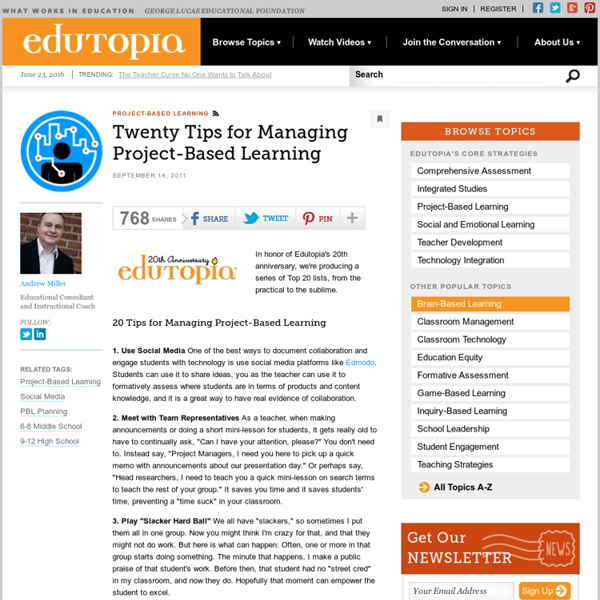Curriculum.htm
Curriculum for the 21st Century A curriculum for the 21st century has certain critical attributes; it is interdisciplinary, project-based, relevant, rigorous and real-world. Even if you teach a single course, for example - Algebra, Botany, 4th grade Social Studies or 8th grade Spanish - you can still design and deliver a curriculum that is 21st century! Teachers today are stressed by the current state of affairs in education, and many feel that they do not have the time to design and deliver a 21st century curriculum. Fortunately, we have examples of many classrooms and schools around the country and the world who are demonstrating phenomenal success by implementing a 21st century curriculum. There is a way to reclaim the joy and success that has been drummed out of teaching and learning by the current epidemic of standardized testing mania. This web site is a continually evolving source of information and ideas. Need More Information?
CASES Online: Creating Active Student Engagement in the Sciences
CASES Online is a collection of investigative lessons, or "cases," for K-12 and undergraduate science education. Using principles of Problem-Based Learning and Investigative Case-Based Learning (and related student-centered pedagogies), our cases are designed to engage students in exploring the science behind real-world problems. Our cases address a variety of learning objectives across the sciences and mathematics. Although our K-12 cases were designed for use in Georgia and meet our state education standards, we have also included the relevant National Science Education Standards. CASES Online is designed to be used by K-12 and undergraduate science educators. CASES Online created at Emory University by:Jordan Rose, MPH, Assistant Director, Emory College Center for Science Education Bryan Schomaker, MS, Communications Specialist, Emory College Center for Science EducationPatricia Marsteller, PhD, Director, Emory College Center for Science Education
High Tech High - Project Based Learning
Seven Successful PBL Projects In March 2005 High Tech High received a $250,000 grant from the California Department of Education to disseminate project-based learning methods to teachers in non-charter public schools. As part of the project, High Tech High teachers have documented successful projects to share with collaborating teachers from local districts and across the HTH network. This New House How does human habitation affect the environment? learn more » Millionaire How can an idea be transformed into a product that could make us millions? learn more » San Diego Field Guide How can we be better environmental stewards of the San Diego Bay? learn more » Urban Art How do math and science influence artistic expression? learn more » Vietnam Project Was the conflict in Vietnam a selfish, colonial move on the part of the United States or was it a general effort to make the world safe from Communism or something in between? learn more » Drug Project learn more » Machines learn more »
Ideas for PBL
A Better List Of Ideas For Project-Based Learning At TeachThought, we’re huge fans of project-based learning. While there is no magic bullet of practice, program, or framework that automatically produces progressive and effective learning, what makes project-based learning exceptional is its flexibility. With PBL, there is no “either/or” proposition: anything from open-ended, play-based learning to data-driven, research-based instructional environments can all use PBL effectively. While there are all kinds of great resources necessary to “run” PBL (including those from Edutopia.org), from apps to planning templates and more, the genesis of a great project is the idea itself–the purpose and/or audience of the project itself. Below, we’ve shared dozens of ideas for projects, and we’re going to constantly update the list with new ideas, suggestions from our community, resources, etc. 6 Posts To Get Started With Project-Based Learning 1. Consider Using: VoiceThread, YouTube, Ancestory.com app



